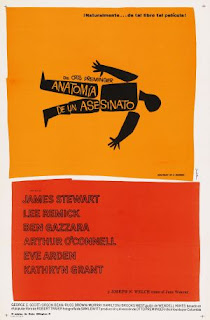 – In terms of cinema’s role as an investigation, the only genre more well-fitted to this than a criminal procedural is a courtroom procedural. Characters are given roles that have thick, black lines for perimeters, and are akin to chess pieces that follow the exact route to reach the mate. Character X can contribute to a, b, and c; Character Y can develop b and introduce d; and Character Z nixes a and c, and solves b. The courtroom drama is the ideal format in cinema for studying the power of truth – the most balanced and fair representation of reality possible. It is no wonder why Anatomy of a Murder is so successful, because it is one of the most thorough examinations of morals, timelines, and truth that I have seen.
– In terms of cinema’s role as an investigation, the only genre more well-fitted to this than a criminal procedural is a courtroom procedural. Characters are given roles that have thick, black lines for perimeters, and are akin to chess pieces that follow the exact route to reach the mate. Character X can contribute to a, b, and c; Character Y can develop b and introduce d; and Character Z nixes a and c, and solves b. The courtroom drama is the ideal format in cinema for studying the power of truth – the most balanced and fair representation of reality possible. It is no wonder why Anatomy of a Murder is so successful, because it is one of the most thorough examinations of morals, timelines, and truth that I have seen.
– I do have trouble with the ending, though: a verdict. For the sake of ambiguity, and the avoidance of didacticism, courtroom dramas should remain without a verdict. The viewer has just spent 2+ hours hearing the arguments, getting to know the defendant, the plaintiff, the judge, the lawyers, the witnesses, and, in some cases, though not Anatomy, the jury. Hearing all of the arguments and seeing all of the evidence, one knows that these are all interpretations of a truth, and are also all, in some way, dishonest, because nobody can have all of the facts with a case this sprawling. Just like the judge and the jury, the viewer is left to pick out what is important and leave the extraneous; reveal the truth and bury the lies, blanket the outcome with a tinge of one’s own morals and sense of what is ‘right.’ This is the nature of cinema itself, no? The filmmaker interprets reality to his liking, and the viewer filters it to exhume a truth that is satisfactory. Saying the verdict at the end of a courtroom drama is equivalent to a filmmaker walking in front of the lens to deliver his message verbally after the plot plays out (see The Holy Mountain as an example of how this might work, though). Sure, the viewer can take or leave the jury’s/judge’s ruling just as any fragment or element of a film can be avoided for the sake of retaining how the film speaks to me. But, it’s an easy, cop-out ending strategy that is never satisfying, and almost always a reason to stop caring. How much longer would Anatomy of a Murder have lingered in my head if I didn’t know if the verdict would be guilty or not guilty? Quite a bit.
